The Psychology Behind Spiritual Crisis Intervention


Spiritual crises are complex phenomena involving profound psychological and spiritual upheavals. Recognized across diverse cultures and spiritual traditions, these episodes can serve as catalysts for growth or become distressing if misunderstood. This article explores the psychological principles behind spiritual crisis intervention, including how mental health frameworks interpret these occurrences, the role of faith and cultural competence, and evidence-based approaches to support individuals through such transformative experiences.
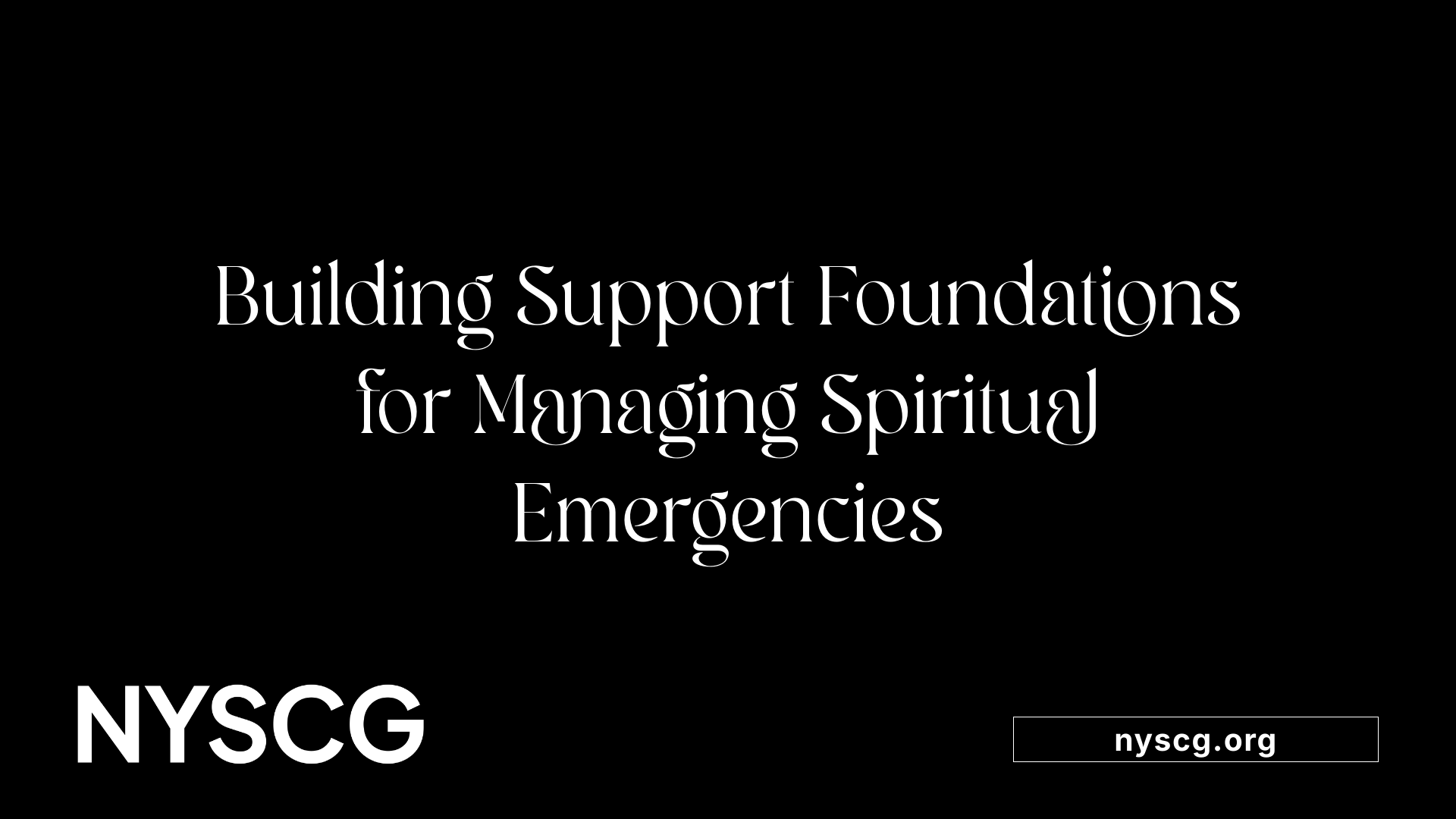
Crisis intervention serves as a vital response to individuals undergoing spiritual emergencies, which are intense episodes of sudden spiritual awakening that can be distressing or disorienting. Its primary goals are to ensure immediate safety, stabilize emotional responses, and provide reassurance.
Supporters of crisis intervention emphasize the importance of creating a compassionate and non-judgmental environment. This setting allows individuals to feel validated and understood without pathologizing their experiences. Instead of focusing solely on symptom reduction, intervention aims at normalizing the person's feelings and perceptions, which can alleviate fear and prevent escalation.
Key techniques include grounding exercises—such as focusing on the senses or physical sensations—to reconnect individuals with the present moment. Mindfulness practices help manage overwhelming emotions or perceptions, providing a sense of control. Reassurance from qualified helpers reduces feelings of chaos, helping the individual regain a sense of stability.
Understanding the spiritual context of the experience is crucial. Recognizing that spiritual emergencies are often part of natural growth or transformation helps avoid unnecessary medication or pathologization. Instead, the focus is on supporting integration—assisting the individual in making sense of their experience—through activities like self-care, community engagement, and education about spiritual processes.
Overall, crisis intervention in spiritual emergencies aims to facilitate a safe, supportive space. This allows the person to navigate their transformative experience with dignity and minimal harm, fostering resilience and potentially promoting lasting spiritual growth.
Yes, there is an expanding body of scientific and research perspectives that examine the psychology of spiritual emergencies. These experiences are increasingly understood not merely as mental health crises but as significant developmental phenomena within the human spiritual and psychological landscape.
One influential framework is Transpersonal Psychology, which explores the connection between consciousness, spirituality, and psychological growth. This field views spiritual emergencies as natural, albeit intense, phases of personal evolution that can lead to profound transformation when supported appropriately. Rather than pathologizing these states, transpersonal practitioners aim to facilitate integration, viewing these crises as opportunities for deep inner change.
Research methodologies in this area often involve qualitative approaches. Foucauldian discourse analysis, for example, is used to understand how different social and cultural discourses shape the interpretation of spiritual and extraordinary mental states. Such studies investigate how spiritual experiences are constructed within various narratives—religious, medical, or secular—and how these constructions influence both personal understanding and clinical response.
The literature highlights the dual nature of spiritual emergencies: on one hand, they can serve as catalysts for growth, fostering increased resilience, awareness, and connection to a larger sense of self. On the other hand, they pose clinical challenges, especially when misunderstood or mishandled within traditional mental health frameworks that often lean toward biomedical models.
An important aspect of ongoing research involves collaboration among diverse stakeholders—clinicians, spiritual teachers, researchers, and individuals themselves. These collaborations aim to develop holistic support systems that validate spiritual experiences, promote safe integration, and harness their potential for personal and collective evolution.
Overall, scientific inquiry into spiritual emergencies emphasizes understanding these experiences within a developmental, cultural, and spiritual context, advocating for respectful, evidence-based, and integrative strategies. Such perspectives foster a more nuanced approach that recognizes the capacity for positive change inherent in these profound states of consciousness.
Faith and spiritual well-being are fundamental in helping individuals navigate through spiritual crises. These elements provide a sense of comfort, hope, and connection to something greater than oneself, which are vital during periods of profound distress and disorientation. When facing a spiritual emergency, such as ego dissolution, visions, or emotional surges, belief systems serve as anchors that foster resilience and aid in meaning-making.
Engagement with spiritual communities during times of crisis offers essential social support and a sense of normalcy. Rituals, prayer, scripture reading, and communal activities create opportunities for shared understanding and healing, helping the individual feel less isolated. Spiritual practices can also induce feelings of calmness and stability, facilitating integration of intense experiences.
Implementing positive religious coping strategies, such as reframing stressful events with hope, expressing gratitude, and trusting in a divine plan, supports emotional resilience and promotes recovery. These approaches help individuals to view challenges not as meaningless suffering but as part of a growth process.
Conversely, addressing negative religious responses, such as guilt, shame, feelings of abandonment by a Higher Power, or moral dissonance, is crucial. Such responses can deepen distress and hinder healing. Providing psycho-spiritual support that recognizes these struggles ensures that spiritual crises do not turn into long-term crises of faith or mental health deterioration.
Faith-based organizations and spiritual leaders often act as vital resources during crises. They offer psychosocial support, spiritual counsel, and community cohesion. Their presence helps rebuild trust in spiritual beliefs and fosters collective resilience.
Incorporating spiritual support into crisis management strategies ultimately enables individuals to restore their spiritual health, find renewed purpose, and re-establish hope. This holistic approach recognizes the intersection of mental health and spiritual well-being, emphasizing that spiritual resilience is integral to recovery after traumatic or transformative experiences.
The blending of spirituality with psychological practice offers a more comprehensive view of an individual's well-being by addressing both the mental and spiritual dimensions of health. This holistic approach recognizes that spiritual identity often plays a vital role in how people understand themselves and cope with challenges.
Research illustrates that spiritual and religious practices—such as meditation, prayer, and rituals—are valuable tools for emotional regulation, fostering hope, and building social connections. These practices can lead to decreased symptoms of depression, anxiety, and even post-traumatic stress. For example, during crises like COVID-19, faith communities provided crucial psychosocial support, highlighting the importance of spiritual resources in resilience.
Training mental health professionals in spiritual and religious competencies (R/S competencies) is essential for effective integration. This training ensures clinicians can respectfully and ethically incorporate clients' spiritual beliefs into therapy, avoiding misunderstandings or misdiagnoses. When therapists are equipped with this knowledge, they can facilitate more personalized treatment plans that honor clients’ values.
Including discussions about faith and spiritual experiences can deepen the therapeutic relationship, making clients feel seen and validated. These conversations often foster increased resilience, especially in trauma recovery or during existential crises.
However, it’s also important to acknowledge that spirituality can sometimes pose risks if misused. For example, spiritual bypassing or fundamentalism might hinder genuine psychological growth. Proper training helps practitioners recognize these risks and guide clients toward balanced spiritual development.
Overall, integrating spirituality and psychology expands the support system for clients, accommodating diverse cultural backgrounds and individual beliefs. This approach promotes overall well-being, encouraging healing that respects the whole person—mind, body, and spirit.
| Spiritual Practice | Mental Health Benefit | Additional Notes |
|---|---|---|
| Meditation & Mindfulness | Reduces stress, enhances emotional regulation | Supported by numerous studies showing decreased anxiety |
| Prayer & Reflection | Fosters hope and resilience | Often used alongside therapy in religious contexts |
| Community & Rituals | Provides social support, sense of belonging | Especially important during crises like pandemic times |
| Art & Nature Engagement | Promotes relaxation, mindfulness | Used to ground clients experiencing dissociative states |
To effectively support clients' spiritual needs, clinicians should pursue ongoing education focusing on:
This training enhances their ability to support clients holistically, avoiding pathologizing spiritual experiences that are valid parts of human growth.
Effective therapeutic interventions integrate spiritual elements through methods such as:
Implementing these strategies requires sensitivity, respect, and awareness of each client's unique spiritual worldview. This fosters an environment where clients can safely explore their spiritual nature and incorporate meaningful practices into their path toward healing.
Psychological principles and theories are fundamental in shaping effective responses to spiritual crises, offering a comprehensive understanding of the inner experiences individuals undergo during such intense moments. These frameworks help practitioners distinguish between spiritual emergencies and mental health disorders like psychosis, enabling more accurate assessment and intervention.
One crucial area involves ego development and self-transcendence theories. These theories describe how individuals evolve in their sense of self, moving from a rigid ego structure to higher forms of consciousness. During spiritual emergencies, the ego may temporarily dissolve or reorganize, leading to profound experiences of unity, transcendence, or disintegration. Recognizing these processes allows therapists to support clients in navigating these states without pathologizing them.
Trauma response theories also provide vital insights. Many spiritual emergencies are triggered by unresolved trauma, acting as catalysts for awakening or crisis. Understanding trauma frameworks aids clinicians in creating a safe space where clients can process these experiences, integrating them into their personal growth rather than viewing them solely as symptoms of mental illness.
Theories from transpersonal psychology further illuminate the importance of self-transcendence—where individuals extend beyond personal identity to connect with something greater. These perspectives affirm the spiritual dimension of human experience, validating symptoms like visions, voices, or out-of-body experiences as meaningful, often transformative events.
Applying these principles involves practical strategies such as active listening, empathetic engagement, and tailored interventions that incorporate spiritual practices alongside psychological techniques like cognitive-behavioral therapy and mindfulness.
Assessment tools grounded in psychological and spiritual concepts facilitate a nuanced understanding of a person's experience. For example, structured questionnaires and interview protocols help identify spiritual themes, emotional responses, and the level of functioning, guiding clinicians in supporting transformation and growth.
Culturally competent interventions also emphasize respecting diverse spiritual beliefs and practices, ensuring support is appropriate and accessible across different cultural contexts. This holistic approach fosters resilience, encourages meaningful meaning-making, and promotes long-term recovery.
In summary, integrating psychological principles—such as ego development, trauma response, and self-transcendence—with spiritual understanding creates a nuanced, respectful framework for crisis support. Such integration not only mitigates misdiagnosis but also harnesses the potential for profound personal transformation, helping individuals emerge from spiritual emergencies with increased awareness and well-being.
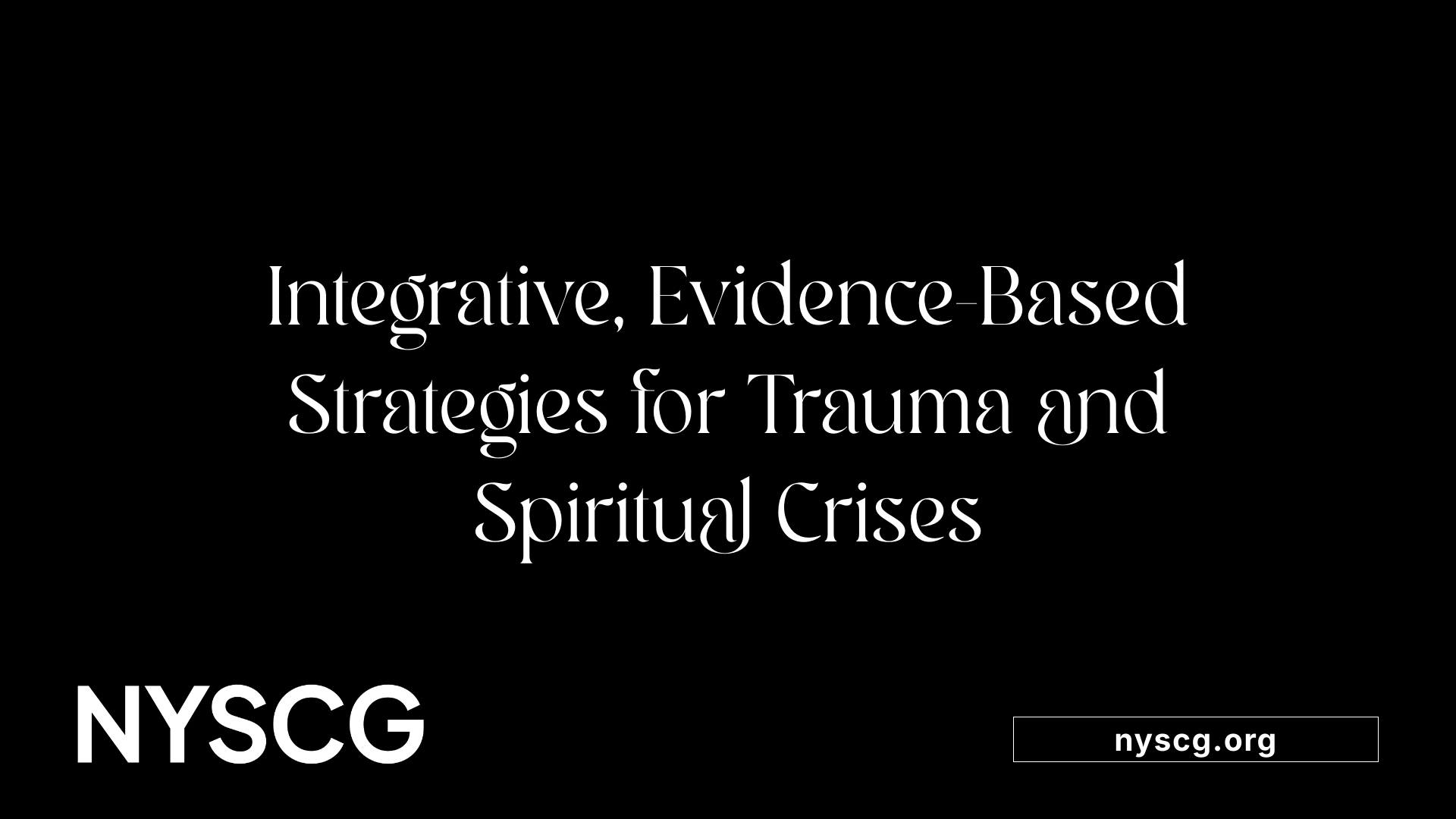
Addressing spiritual crises within the context of trauma or PTSD requires nuanced, culturally sensitive, and integrated therapeutic approaches. One effective method involves trauma-informed care that incorporates thorough spiritual assessment. This approach enables clinicians to explore their clients’ spiritual beliefs, practices, and struggles in an ethical manner, fostering trust and understanding.
Cognitive-behavioral therapy (CBT) can be tailored to include spiritual coping techniques. For example, therapists might help clients reframe their traumatic experiences through spiritual lenses, promoting resilience and positive growth. This adaptation respects individual spiritual frameworks and helps mitigate feelings of spiritual dissonance or loss.
In addition, specialized spiritual therapies such as trauma-informed guilt reduction, compassion-based meditation, Loving-kindness Meditation, and the Mantram Repetition Program provide structured pathways for clients to navigate spiritual struggles. These practices foster emotional regulation, compassion, and a sense of connection, which can be especially beneficial for those grappling with feelings of guilt, moral injury, or existential distress.
Collaboration with spiritual or religious leaders is another vital component. When appropriate, integrating the insights of faith leaders can enhance treatment by aligning therapeutic goals with spiritual values, ensuring respectful and personalized care.
Mental health professionals are encouraged to evaluate their own comfort and competence in addressing spiritual matters. Basic training in spiritual assessment and sensitivity can significantly improve the effectiveness of interventions.
Ultimately, the integration of spiritual understanding into trauma therapy helps create a holistic healing environment. By validating spiritual experiences rather than pathologizing them, clinicians facilitate post-trauma recovery, resilience, and even spiritual growth, transforming distress into a catalyst for profound personal transformation.
| Approach | Description | Additional Notes |
|---|---|---|
| Trauma-informed spiritual assessment | Ethical exploration of beliefs, struggles, and strengths | Builds foundation for personalized care |
| Spiritual-adapted CBT | Reframing trauma through spiritual perspectives | Enhances resilience and meaning-making |
| Spiritual-focused therapies | Guilt reduction, compassion meditation, Loving-kindness practices | Structured methods to process spiritual distress |
| Collaboration with spiritual leaders | Partnering with faith figures where appropriate | Enhances cultural competence and client trust |
| Clinician self-competency development | Training in spiritual assessment and sensitivity | Ensures respectful, effective intervention |
This integrative, respectful approach supports recovery by addressing both psychological and spiritual dimensions of trauma, fostering resilience, growth, and spiritual well-being.
Spiritual crises often manifest through a variety of psychological symptoms that can be intense and sometimes overwhelming. These symptoms can mirror mental health conditions like psychosis, making careful recognition essential.
One of the most noticeable features of a spiritual emergency is emotional upheaval. Individuals may experience rapid mood swings, feelings of deep grief, episodes of anxiety, or emotional numbness. These emotional shifts are often accompanied by heightened sensitivity to their surroundings, leading to a sense of being overwhelmed or overstimulated.
Altered perceptions are another hallmark of spiritual crises. People might encounter visual or auditory hallucinations—seeing visions or hearing voices that seem real but are not rooted in external stimuli. These visions may include vivid flashbacks of past lives or encounters with spiritual or supernatural entities.
Physical sensations frequently occur during these states. Individuals might report vibrations, waves of heat, or strange feelings within their bodies, along with sensations of energy surges or discharges. These experiences are often misinterpreted but can be signaling a profound internal shift.
Sleep disruptions are common; insomnia or difficulty maintaining regular sleep patterns often accompany spiritual emergencies. These disturbances can intensify feelings of disorientation and confusion.
Certain signs are more subtle yet significant, such as noticing unusual synchronicities—meaningful coincidences that seem to carry cosmic significance. Feelings of being chosen or possessed by other entities, or beliefs in alien abduction or spiritual possession, may also emerge. Such beliefs can be distressing and confusing, especially if they contradict personal or cultural norms.
Recognizing these symptoms within the broader context of spiritual awakening can guide individuals and clinicians to provide appropriate support. It is vital to distinguish between a healthy process of spiritual emergence and a crisis that requires intervention.
Support from mental health professionals trained in transpersonal psychology or spiritual integration can promote healthy processing of these experiences, aligning them with personal growth and development rather than pathology.
Coping with spiritual emergencies requires a thoughtful and supportive approach that respects the individual's spiritual and psychological needs. Psychological frameworks emphasize a combination of psychoeducation, grounding techniques, and spiritual practices as effective strategies.
Psychoeducation plays a vital role by helping individuals understand the nature of their experiences. Learning that certain visions, feelings, or disorganized thoughts are part of a spiritual process can reduce fear and shame. It fosters acceptance and encourages a healthy outlook towards these states, framing them as potential growth opportunities rather than signs of pathology.
Grounding techniques are essential for stabilization during distressing moments. These include practices that bring attention to the present, such as deep breathing, mindfulness exercises, sensory awareness activities, or physical movements like walking or stretching. Grounding helps individuals reconnect with their body and reality, reducing overwhelm, and creating a sense of safety.
Incorporating spiritual practices like prayer, meditation, or reflective rituals provides comfort, meaning, and a sense of connection. For many, prayer and meditation serve as portals for integrating intense experiences by fostering trust in a higher power or the universe. Activities like Lectio Divina, engaging with sacred texts, or participating in community rituals reinforce positive spiritual engagement and can anchor the person in their spiritual journey.
Support from spiritual counseling or support groups that value both psychological and spiritual well-being fosters resilience. These environments offer validation, understanding, and sharing of experiences, reducing feelings of isolation. Community belongingness is shown to be important in coping and can provide much-needed social support.
Moreover, addressing spiritual struggles with compassion, openness, and flexibility can facilitate growth and deepen one's spiritual resources. Exploring doubts, fears, or conflicts without judgment allows for integration rather than repression.
In cases where spiritual emergencies pose a threat to mental health, seeking professional help that specializes in integrating spiritual and psychological care is crucial. Such care ensures that interventions respect the individual's beliefs, promote safety, and support growth.
Overall, effective coping strategies involve a holistic blend of education, practical stabilization methods, spiritual connection, community support, and professional guidance. These approaches transform a challenging experience into an opportunity for personal and spiritual development.
| Strategy Type | Methods and Practices | Purpose and Benefits |
|---|---|---|
| Psychoeducation | Understanding spiritual states, normalizing experiences | Reduce fear, promote acceptance, foster growth |
| Grounding techniques | Deep breathing, sensory awareness, physical activity | Stabilize, reconnect with reality, reduce overwhelm |
| Spiritual practices | Prayer, meditation, sacred rituals, reflection | Foster connection, hope, meaning, and trust in higher power |
| Support networks | Spiritual counseling, support groups | Validation, sharing, reducing isolation |
| Exploring spiritual struggles | Open dialogue, compassion, flexibility | Growth, resource deepening |
In sum, navigating a spiritual emergency benefits from an integrated approach that combines psychological understanding, practical stabilization, meaningful spiritual engagement, and social support. This holistic model not only supports immediate coping but can lead to enduring personal and spiritual development.
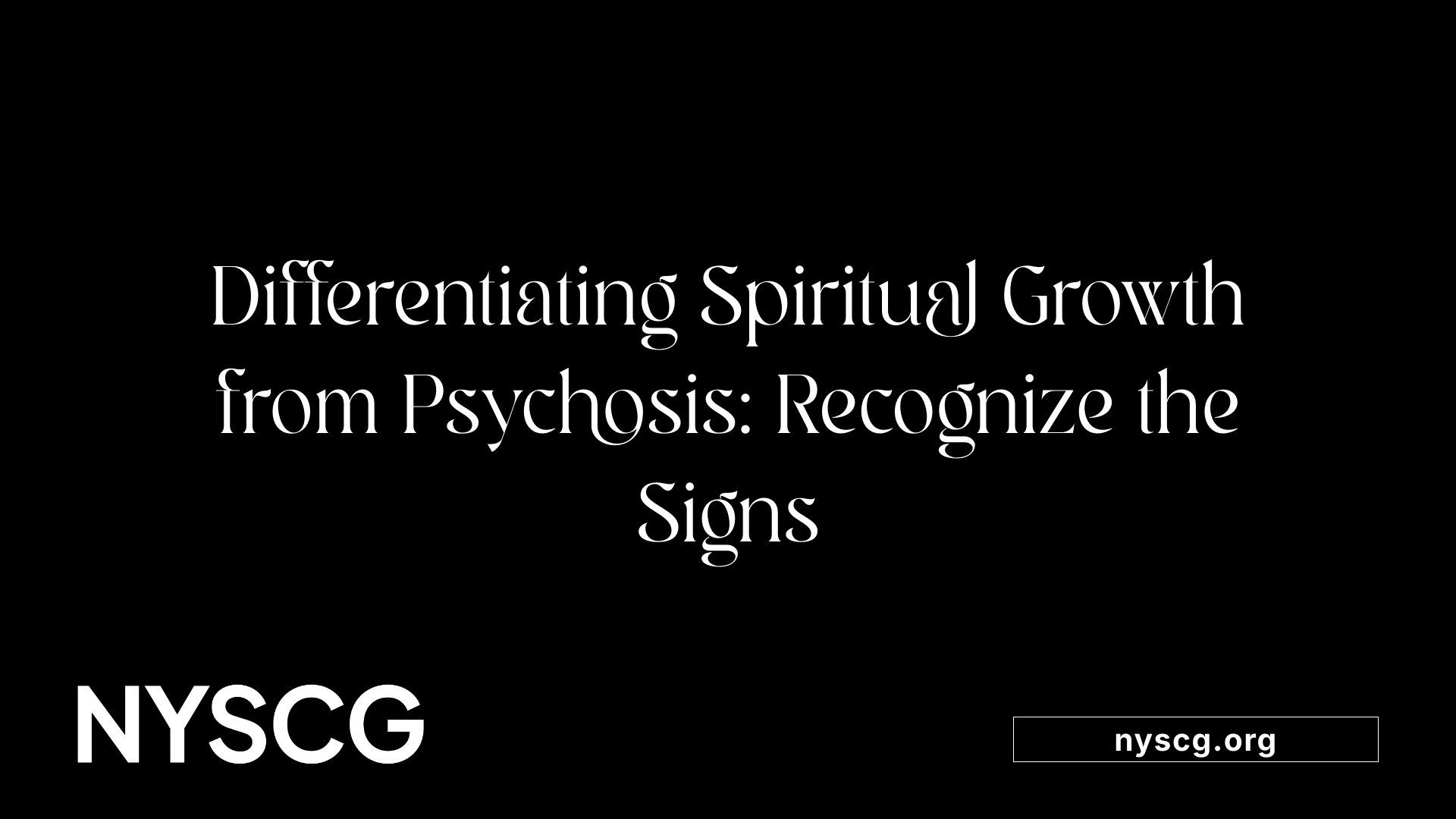
Psychological differences between spiritual crises and psychosis primarily involve the stability of self-identity and the outcome of the experience. During a spiritual crisis or awakening, individuals typically maintain a coherent sense of Self, and their experiences often lead to personal growth, increased meaning, and integration within their cultural or spiritual framework.
In contrast, psychosis usually involves an unstable or fragmented sense of Self, with hallucinations, delusions, disorganized thinking, and impaired functioning that can cause distress or harm.
While both states may present similar symptoms, such as perceptual changes or intense emotional experiences, spiritual crises tend to be contextually meaningful and temporary, whereas psychosis often involves persistent, idiosyncratic beliefs and symptoms that impair daily life.
Overall, the key differences are in the phenomenological features, cultural interpretation, and the potential for positive outcomes with proper support.
People experiencing spiritual emergencies often report feelings of unity, encounters with supernatural beings, or visions related to death and rebirth. These experiences are experienced as meaningful and connected to a broader spiritual or transpersonal context.
Conversely, psychosis might involve hallucinations or delusions that are bizarre, disconnected from reality, or carry themes of paranoia, alienation, or confusion. The emotional responses during spiritual crises can be intense yet are frequently accompanied by feelings of compassion and understanding, whereas psychotic experiences may be marked by fear, suspicion, or distress.
Spiritual states often include an altered but integrated perception of reality, while psychosis features a disorganized or fragmented perception, potentially disrupting the person's sense of self and their environment.
Cultural beliefs and context substantially shape how individuals interpret and respond to their experiences. In traditional and Indigenous cultures, spiritual emergencies are seen as a calling, a sacred passage to become healers or shamans, and are revered rather than medicalized.
Western medicine, however, tends to interpret similar experiences through a pathologizing lens, often diagnosing them as psychosis. Lack of cultural awareness by mental health professionals can lead to misdiagnosis and inappropriate treatment.
Cultural context influences whether an experience is viewed as a spiritual awakening, a mental health emergency, or a psychotic episode. Recognizing these influences is crucial for appropriate support.
Signs of stability include the individual's ability to maintain a coherent narrative about their experience, recognize its spiritual or symbolic meaning, and function effectively in daily life.
They retain a sense of purpose and connection, and their emotional responses, although intense, are balanced and rooted in understanding.
In contrast, disorganized behavior, confusion about reality, inability to function, and persistent hallucinations or delusions suggest a loss of coherence typical of psychosis.
Supporting factors such as a positive mindset, supportive environment, and adequate integration techniques help promote stability during spiritual emergencies.
Assessment involves evaluating the individual's level of functioning, the context of the experience, their interpretation, and response to grounding techniques.
Clinicians observe if the experience is temporary and meaningful or persistent and disruptive.
They examine whether there is a coherent narrative, absence of threats to self or others, and whether the individual maintains reality-based thinking.
In practice, collaboration with culturally competent professionals and consideration of the person's spiritual or cultural background are essential to reduce misdiagnosis.
| Aspect | Spiritual Crisis | Psychosis | Additional Considerations |
|---|---|---|---|
| Nature of Experience | Transpersonal, meaningful, often symbolical | Disorganized, bizarre, often threatening | Context and interpretation crucial |
| Self-awareness | Maintains coherence, can integrate experience | Fragmented, loss of self-control | Support enhances stability |
| Cultural interpretation | Revered or accepted in spiritual contexts | Dismissed or pathologized in medical settings | Cultural sensitivity necessary |
| Emotional response | Intense but often compassionate | Fear, paranoia, distress | Emotional tone indicates interpretation |
| Outcome | Potential for growth and integration | Usually persistent, impairment | Proper support can influence trajectory |
Understanding these distinctions helps clinicians and individuals recognize when a spiritual experience can be a transformative crisis or when it signals a mental health disorder requiring specialized intervention. Proper assessment and cultural awareness are vital to support recovery and growth.
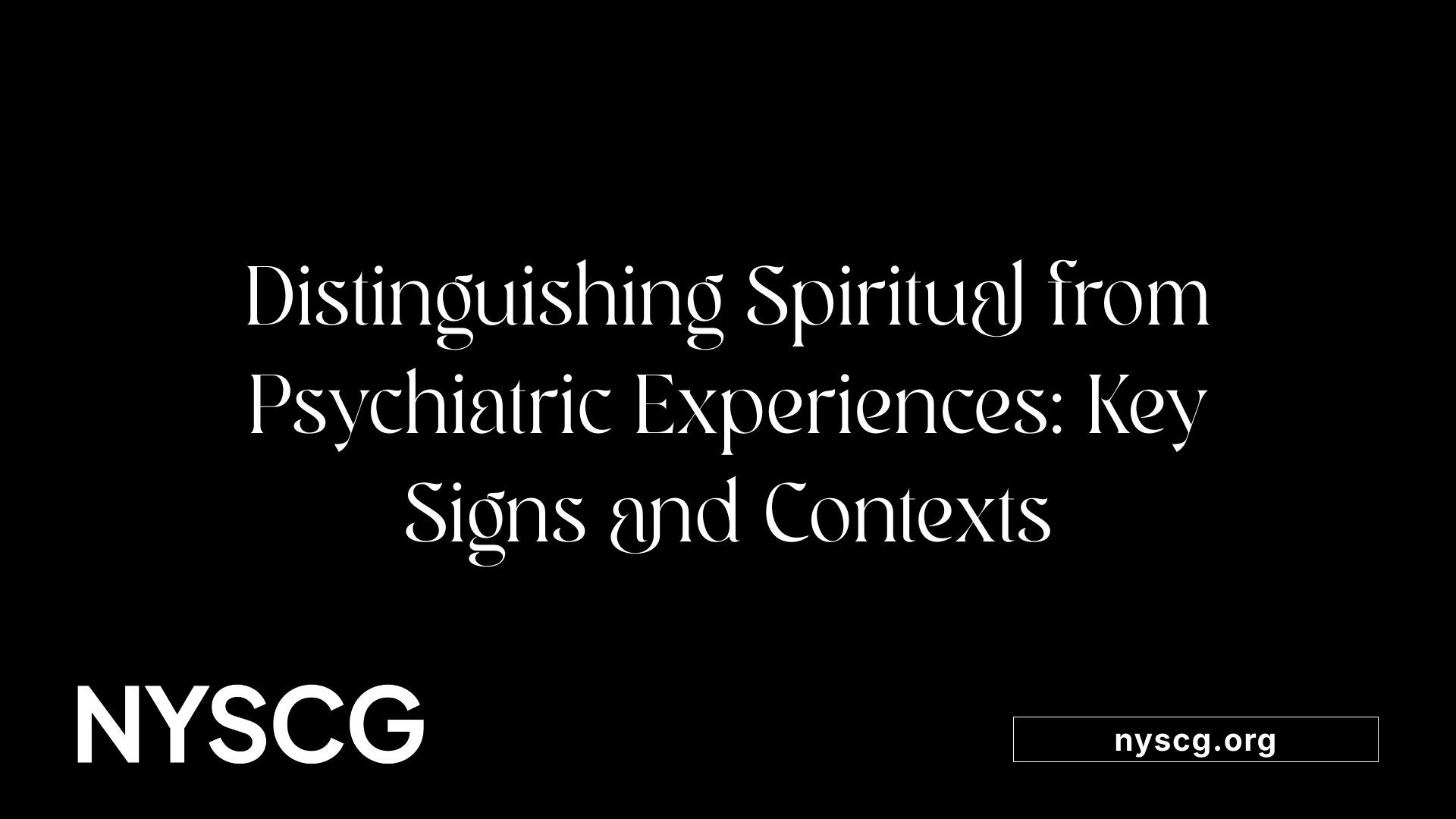
Differentiating between spiritual crises and psychosis is a nuanced process that requires careful assessment of the individual's experiences, context, and functioning. Mental health practitioners play a vital role in carefully evaluating whether an experience is rooted in spiritual growth or indicative of a mental health disorder.
One of the primary considerations is the overall sense of stability and coherence in the person's experiences. Spiritual crises often occur suddenly and can involve intense feelings of unity, encounters with supernatural entities, or moments of ego dissolution. These experiences are typically temporary, culturally consistent, and may lead to a transformed sense of purpose or meaning.
In contrast, psychosis involves persistent hallucinations, delusions, and disorganized thinking that significantly impair daily functioning. Symptoms such as auditory or visual hallucinations or paranoid beliefs tend to be more fixed, distressing, and often resistant to immediate sense-making. Psychotic symptoms are also more likely to persist over a longer duration and may cause a loss of touch with reality.
Timing and impact on life functioning are critical clues. Spiritual emergencies often arise during extreme stress, trauma, or existential crises and can resolve with appropriate support and understanding. These experiences might temporarily challenge an individual's worldview but usually do not interfere with their ability to function once integrated. Conversely, psychosis often results in ongoing difficulties, disorientation, and inability to distinguish between reality and hallucinations.
Another important aspect is the individual's insight and reaction to their experiences. Those undergoing spiritual crises typically demonstrate insight, can discuss their experiences coherently, and often report feelings of growth, increased meaning, or connection afterward. People with psychosis may lack awareness that their perceptions are unreal and might be overwhelmed or frightened by their symptoms.
Cultural and spiritual contexts heavily influence how experiences are interpreted. In many cultures, spiritual or mystical experiences are regarded as natural and meaningful, often associated with rites of passage or healing. Western psychiatry, however, historically tends to pathologize such experiences, leading to misdiagnosis and unnecessary treatment.
Ultimately, a comprehensive assessment involves examining the content of the experiences, the person's memory and insight about them, their duration, the degree of distress or impairment caused, and cultural background. Collaborating with spiritual or cultural advisors can also enhance understanding.
Including cultural and spiritual specialists in the assessment process ensures a respectful and holistic understanding of the individual’s experiences. These experts can interpret experiences within the appropriate cultural framework, helping differentiate culturally sanctioned spiritual phenomena from symptoms of mental illness.
By integrating knowledge from these domains, mental health professionals can avoid misdiagnoses, reduce stigma, and provide support that aligns with the person's values and beliefs. This approach fosters trust, promotes healing, and respects the diversity of human spiritual expression.
| Aspect | Spiritual Crisis | Psychosis | Additional Notes |
|---|---|---|---|
| Onset | Often sudden, linked to stress or trauma | Gradual or sudden, depending on disorder | Contextual triggers are common in spiritual crises |
| Duration | Usually brief, resolves with support | Can be chronic or episodic without intervention | Duration influences diagnosis |
| Coherence | Experiences are meaningful, culturally consistent | Disorganized, disconnected thoughts | Coherence and cultural context are crucial |
| Symptoms | Visions, feelings of unity, ego dissolution | Hallucinations, delusions, disorganized speech | Experience type guides understanding |
| Response to Treatment | May improve with supportive care, integration | Often requires medication and therapy | Treatment approaches differ |
| Insight | Usually high; person understands experience | Often low; unaware of abnormality | Insight levels inform diagnosis and support |
| Cultural Context | Emphasized as meaningful and contextual | Usually seen as pathological | Cultural framing prevents misdiagnosis |
Understanding these distinctions supports more accurate diagnoses and respectful, effective care. Recognizing spiritual experiences as potentially transformative rather than pathological helps promote mental health wellbeing and holistic healing.
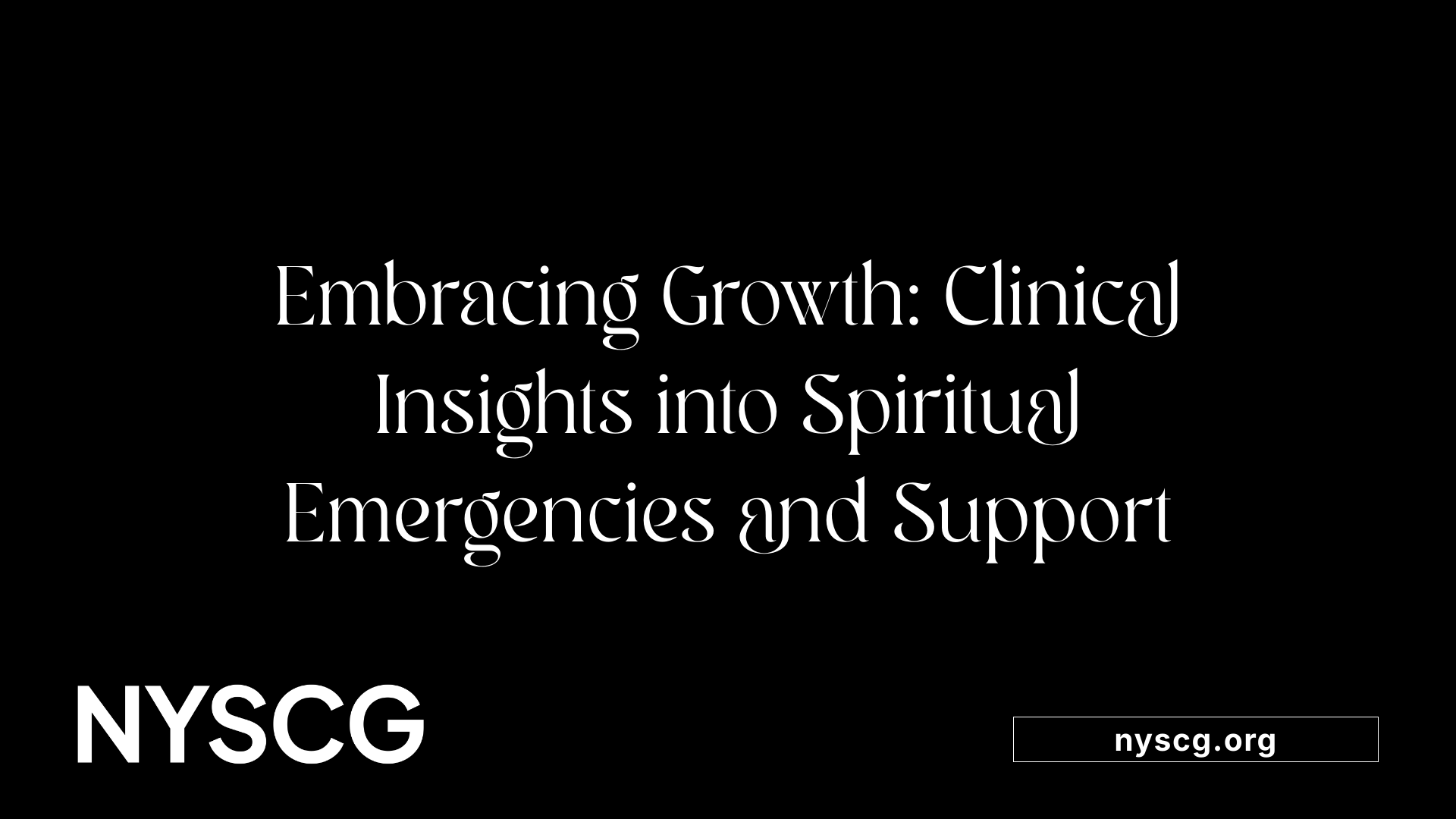
A spiritual emergency is a challenging but potentially transformative experience characterized by a sudden or intense shift in consciousness, often involving ego dissolution, altered perceptions, visions, and emotional upheaval. It may include symptoms such as disorganized behavior, unusual spiritual beliefs, sensory changes, and feelings of unity or encounters with spiritual or supernatural entities, sometimes resembling psychosis. These experiences can be triggered by factors like trauma, physical or emotional stress, drug use, or spiritual practices, and are often misinterpreted as mental illness.
Unlike pathological conditions, a spiritual emergency is not inherently a disorder but rather an organic process that can foster growth and healing if properly supported. When viewed through a holistic and culturally sensitive lens, these episodes are understood as part of an individual's spiritual or psychological evolution.
Supporting individuals during such crises involves recognizing the significance of their experiences, validating their perceptions, and providing a safe environment for integration. Therapeutic strategies should aim at reducing distress, validating the spiritual dimension, and facilitating personal growth. This approach can transform what appears to be a breakdown into a breakthrough, promoting resilience, expanded consciousness, and profound self-awareness.
Many practitioners and researchers advocate for viewing spiritual emergencies as pivotal moments of transformation rather than solely pathological episodes. These experiences can serve as catalysts for deepened self-awareness, emotional healing, and spiritual awakening.
Supporting this perspective involves emphasizing the potential benefits of such crises, such as increased resilience, enhanced spiritual connection, and a sense of renewal. Therapeutic models inspired by transpersonal psychology and integrative approaches prioritize understanding and nurturing the positive outcomes, helping individuals emerge from crises with strengthened identity and purpose.
Cultural context plays a central role in how spiritual experiences and emergencies are perceived and managed. In traditional and Indigenous cultures, such phenomena are often regarded as sacred rites or calling to serve as healers or shamans, thus receiving reverence rather than pathology.
Clinicians and helpers must develop cultural and spiritual competence to avoid misdiagnosis and cultivate respectful, appropriate support. This includes understanding diverse spiritual beliefs, practices, and societal norms, and recognizing that interpretations of experiences vary across cultures.
Sensitive intervention involves validating the individual's worldview, avoiding dismissive or dismissive language, and collaborating with spiritual leaders or community resources when appropriate. Doing so fosters trust, enhances healing, and aligns treatment with the individual's spiritual framework.
Approaches that incorporate mind-body-spirit integration are most effective in managing spiritual crises. These models emphasize understanding the interplay between psychological, spiritual, and physiological factors.
Methods such as somatic therapy, mindfulness, creative arts, and community involvement support integration. Such approaches respect the individual's spiritual journey and aim to restore balance and self-coherence.
Practitioners should focus on grounding techniques, emotional regulation, fostering safe expression of spiritual experiences, and promoting social support networks. This holistic perspective prevents treatments from pathologizing spiritual phenomena and instead leverages their transformative potential.
Effective support during spiritual emergencies involves several principles:
| Principle | Description | Practical Applications |
|---|---|---|
| Validation | Recognize the experience as meaningful | Listen without judgment; affirm the individual's feelings and perceptions |
| Safety and Grounding | Establish a sense of safety | Use grounding techniques, reduce stimulation, encourage self-care |
| Integration | Support processing and making meaning | Facilitate creative expression, journaling, reflection, and community engagement |
| Cultural Respect | Honor cultural and spiritual background | Collaborate with cultural or spiritual leaders; education on diverse belief systems |
| Collaboration | Work with multi-disciplinary teams | Coordinate with mental health professionals, spiritual counselors, and community resources |
In conclusion, understanding spiritual emergencies as complex, culturally embedded phenomena allows clinicians to offer more nuanced, compassionate, and effective care. Recognizing the potential for growth inherent in these crises can transform therapeutic approaches, fostering resilience and spiritual development amid distress.
Understanding the intersection of psychology and spirituality is essential for supporting individuals through spiritual crises effectively. Recognizing the signs, respecting cultural and spiritual contexts, and applying evidence-based, holistic interventions can turn potentially distressing episodes into opportunities for growth. Mental health professionals and spiritual guides alike must work together, employing culturally competent, compassionate practices rooted in scientific understanding. As research continues to deepen our comprehension of these profound experiences, the integration of psychological principles with spiritual sensitivity will remain a cornerstone of effective crisis intervention, ultimately fostering resilience, healing, and transformation in those navigating their spiritual journeys.
All you need is the will to make the world a better place.
New York State chaplain group inc. is a tax deductible organization with a federal tax Id number 92-383-4921